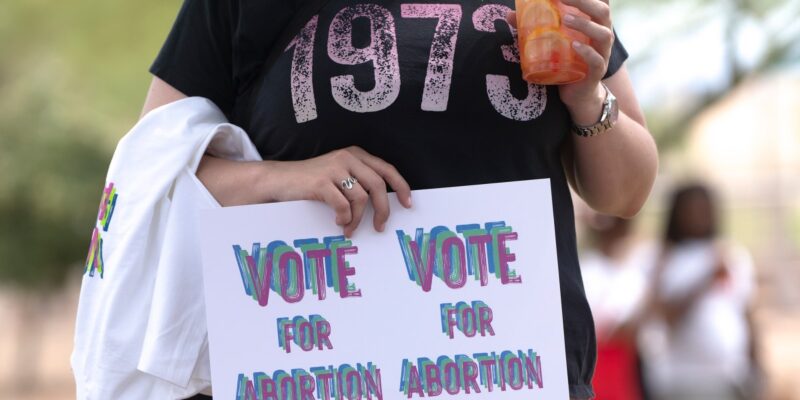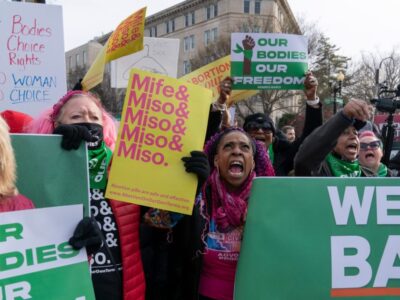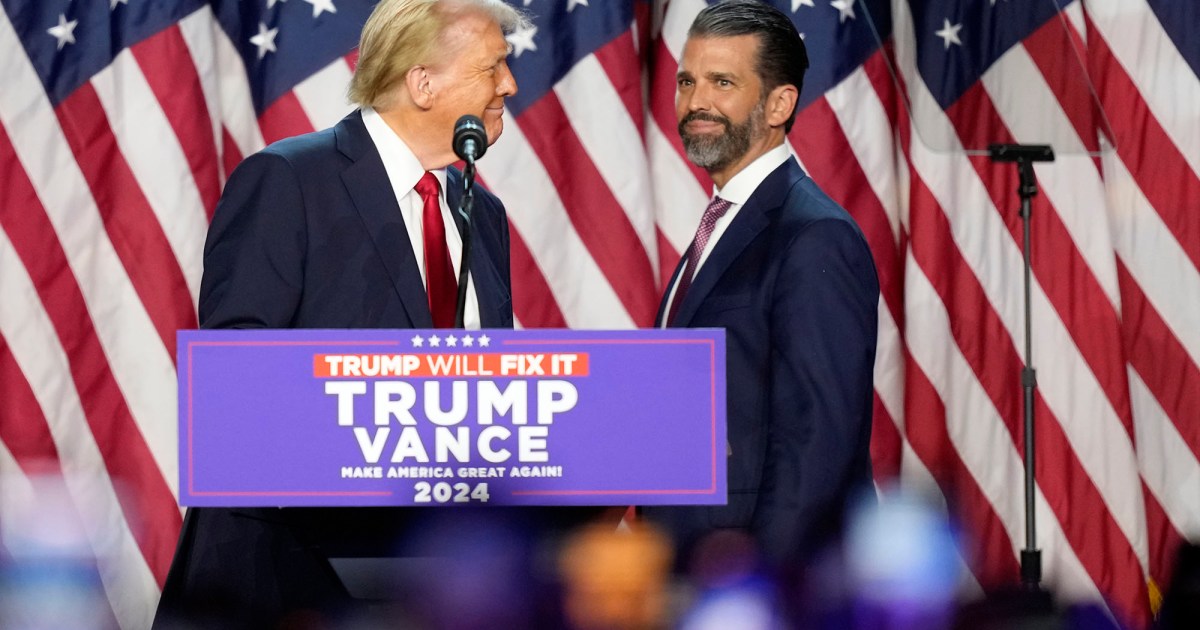
On a quiet Saturday morning in June, a few days before their deadline to collect signatures for a referendum to enshrine the right to an abortion in the Arizona Constitution, Sandy Adler and three friends from Stand Indivisible AZ were standing with clipboards and literature by the entrance to a park in Scottsdale, waiting for the last stragglers to come in.
The four women—Adler, Julie Karcis, Sandy Kravetz, and Barrie Stachel—had been hitting up acquaintances and staking out friendly businesses for months. After the state supreme court reinstated an 1864 territorial law that banned abortion with no exceptions for rape or incest, Stachel brought her petition sheets to a house party and collected 25 signatures in half an hour. When Adler showed up at a coffee shop where they often gathered signatures on Sundays, there was a line of people waiting to sign. She kept a stack of petitions in her car, just in case, she told me. Karcis, a notary public, had begun making house calls to bring forms directly to supporters who could not otherwise meet up.
“We go where the signature is,” Adler said.
By the final weekend, they were running into the sort of problem that any organizer would be glad to have: So many people had already signed that it was becoming harder to find people who hadn’t. In July, Arizona for Abortion Access, the non-partisan coalition that’s leading the referendum campaign, showed up at the secretary of state’s office with 823,685 signed petitions—a record for a citizen-led ballot initiative in Arizona, and well more than double the threshold to get on the ballot. (To put that number in perspective, it’s nearly two-thirds of Democrat Gov. Katie Hobbs’ winning vote haul two years ago.)
“[Republicans] are going to try and pull shady maneuvers and scams to get their way. We know to expect the unexpected when it comes to our opposition. We are seeing them out lying about what the measure does, and we’ve seen that in other states.”
The crew from Stand Indivisible was one small part of a movement of more than 7,000 volunteers who fanned out across the state after the campaign kicked off last August. They camped out at tattoo parlors, bookstores, and trailheads; a climbing gym; a crystal shop; and even, organizers boasted, a bunco club for retirees in Bullhead City. The stakes are huge in a state of more than 7 million people, where the repeal of the territorial law this spring left a newer 15 week-ban on the books, and exceptions only for medical emergencies. If Proposition 139, which guarantees the right to an abortion until the point of fetal viability, passes in November, Arizona will become at least the fifth state to adopt such protections by popular vote since the US Supreme Court threw out Roe v. Wade in 2022.
But the ballot measure could also have ripple effects in the state’s volatile politics. Abortion is likely to play a significant role in the fight for control of the state legislature, where Republicans hold both chambers by one-seat margins, and Democrats are aiming to capitalize on a groundswell of voter enthusiasm for the amendment. Donald Trump has claimed that, in jettisoning Roe, the Supreme Court had merely freed states to experiment with the laws that best fit. Arizona offers a glimpse of what that looks like on the ground: A determined grassroots movement is taking the initiative to restore a constitutional right—while restrictionists, after finally winning the prize they always wanted, have thrown everything at the wall to try to stop them.
Arizona’s abortion politics has shifted dramatically over the last few years, as years of hard-line conservative governance clashed with post-Roe electoral realities. Not long before the Dobbs ruling in 2022, Republican Gov. Doug Ducey signed a law banning all abortions after 15 weeks, with no exceptions for victims of rape or incest. But the state had never repealed the earlier law from 1864, which banned all abortions, period, except to save the life of the mother. That law was unconstitutional under Roe. But after Dobbs, many Republicans wanted it enforced. Kari Lake, the 2022 nominee for governor who is now the party’s candidate for US Senate, called it a “great law” and believed that Arizona would be “paving the way and setting course for other states to follow.”
Instead, the state supreme court granted an injunction that blocked the 1864 law for nearly two years. When the state supreme court finally upheld the territorial law this spring and the near-total ban went into effect, abortion opponents flailed. Donald Trump, whose Supreme Court had made the law constitutional again, said he was opposed to it. Lake said she was now against the law, denied she had ever supported it, and sometimes still sounded like she was for it. Republicans in the legislature initially blocked efforts to overturn the statute—even gaveling out of session to avoid taking up a repeal bill. Eventually, the legislature did throw out the old law, but with almost every Republican voting against it. By making the 15-week ban the standalone law, they managed to produce an outcome that plenty of Republican leaders claimed they wanted, but which rank-and-file members had mostly opposed at every step of the way.
“I think that if the last couple of months have demonstrated anything to Arizona voters, it is that politicians and judges cannot be entrusted with this very important issue,” Cheryl Bruce, campaign manager for Arizona for Abortion Access, told me, when we met at the group’s office above a coffee shop in Phoenix.
“There is still an extreme ban on the books, and there will be an extreme ban here in Arizona until we pass this ballot measure.”
Supporters of abortion rights briefly tried to gather signatures for a ballot initiative in 2022, but the short timeline between the Dobbs ruling and the midterms doomed the effort. A coalition of major groups including Planned Parenthood, the Latino organizing powerhouse Living United for Change Arizona (LUCHA), and SEIU affiliate Healthcare Rising, committed millions of dollars to get a proper campaign underway in 2023. But as reproductive rights referenda won big in places like Ohio and Michigan, opponents have stepped up their efforts to stop them.
“They are going to try and pull shady maneuvers and scams to get their way,” Bruce predicted in June. “We know to expect the unexpected when it comes to our opposition. We are seeing them out lying about what the measure does, and we’ve seen that in other states. But ultimately voters, I think, can discern what is and is not true and support this issue very broadly.”
Anti-abortion Republicans in Arizona have tried a variety of methods to defeat the referendum. The Arizona Mirror reported in April that Republicans in the legislature were considering putting their own, far more restrictive abortion referendum on the ballot that would be in competition with the citizen-led initiative. A group called It Goes Too Far, which is backed by the right-wing Center for Arizona Policy, led a “Decline to Sign” campaign during the signature drive, with little success. After the signature deadline, the anti-abortion organization Arizona Right to Life sued to stop the referendum from appearing on the ballot, arguing, unsuccessfully, that the law’s wording “misrepresents the initiative’s effect.” And in perhaps the most cynical twist, a Republican-dominated legislative committee, which was responsible for drafting “impartial summaries” of ballot initiatives for voter guides, used the term “unborn human beings” to describe fetuses. A Maricopa County court forced the panel to change its wording in July, but last month, the state supreme court ruled that the language could remain.
The attempts to undercut the abortion-rights amendment have coincided with a broader effort to make it harder for organizers to get citizen-driven initiatives on the ballot in future elections, after a wave of successes in recent years that raised the minimum wage, and guaranteeing in-state tuition for non-citizens. Another voter question this year, which was placed on the ballot by Republican legislators, would require organizers for proposed constitutional amendments to collect signatures from at least 15 percent of the gubernatorial electorate in each legislative district. Currently, organizers are required to collect the equivalent of 15 percent of the statewide electorate, but without regard to individual districts.
The Arizona referendum is officially non-partisan. The recent successes in Michigan and Ohio—and the defeat of anti-abortion measures in deep-red Kansas and Kentucky—suggest an undercurrent of support for reproductive rights that often cuts across political affiliation. And Arizona is not the only state with an abortion amendment on the ballot this fall. Voters have a chance to guarantee a right to abortion until viability in Nebraska (which currently bans abortions after 12 weeks), and Florida and Missouri (which currently ban abortion entirely). In South Dakota, which also has a total ban, a referendum would restore abortion access for the first trimester, with some exceptions in the second trimester.
Bruce believes that in a notoriously purple state like Arizona, supporters “have a more expansive opportunity here to really run the margin up on what any partisan candidate is going to be able to achieve.”
A recent survey from Fox News found that voters approved of the Arizona amendment by a three-to-one margin—with 50 percent of Republicans saying they’d vote for it. But that surge in support among Republicans and independents who often support them has not bled over into the ranks of Republican elected officials. While a handful of Republicans broke ranks to repeal the territorial law, no Republican legislator has so far come out in support of the measure to protect abortion until viability. In fact, one of the three Republican votes for repeal in the state house, Tim Dunn, argued in a statement at the time that scrapping the territorial statute was necessary in order to stop the referendum from passing:
“Should this pre-Roe law remain in effect, I firmly believe more lives will be lost over time. The public backlash would result in codifying disturbing and unlimited abortions in the Arizona Constitution, which is something that I cannot allow to happen.”
Democrats, who ran hard against abortion restrictions in 2022 and defeated the author of the 15-week abortion ban in a key swing district, see an opportunity to draw a clear partisan line. The party is hammering the issue in nearly a dozen targeted races across the state. When I dropped by a local Democratic field office in a Phoenix shopping center earlier this year, a few dozen volunteers crowded into the space for a morning canvas tied to the anniversary of the Dobbs decision. There were signs on the wall of the cramped front room for the ballot question, and stacks of clipboards for Deborah Howard, a Democrat running for state house in a key swing district, with scripts advising volunteers to bring up the issue.
“When I was collecting signatures to get on the ballot, my spiel was, ‘Hi, I’m Deborah Howard, and I’m running to be your representative at the state capitol, and I have the Arizona Abortion Access Initiative—would you like to sign it?,’” she told me. “And people ran out the door. That’s when they unlocked their screen door. They came out, they signed the initiative, and once they were done with that, they would look at me, and they’d go ‘And what are you doing? And who are you?’
One of the unknown variables was how the legislature’s repeal of the near-total 1864 ban would affect the campaign. The campaign for a tossup state senate seat in LD2, which extends through the suburbs north of Phoenix, offers a test case. There Judy Schwiebert, a Democratic state representative, is facing the incumbent Republican, Shawnna Bolick, who cast a vote to repeal the 1864 law but also gave a floor speech asking voters not to sign petitions for the initiative, signed onto an amicus brief calling for Roe to be overturned, and co-sponsored a 2021 bill that would have made abortion a capital crime. (In a twist, Bolick’s husband, Clint, is a state supreme court justice who had sided with the majority in voting to uphold the territorial ban.)
Schwiebert told me she was “concerned that when we repealed it, that that would take the air out of the issue.”
But so far, that hasn’t come to pass, she said—because while voters wanted the legislature to repeal the law, they really wanted abortion to be out of the legislature’s hands.
“I have found that people at doors don’t want this to be a political issue,” Schwiebert said. “They want this to be an issue that is protected in our Constitution….They’ve seen it be a political football for too long, they want it to be a personal decision.”















